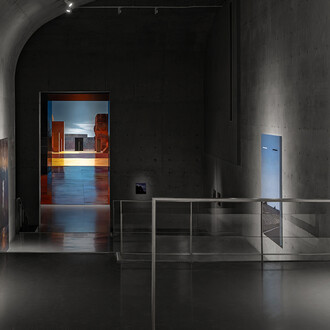Long Museum West Bund is pleased to announce Immortals, a solo exhibition of paintings by Daniel Crews-Chubb in Shanghai. Opening on 7 November, the artist’s first major solo museum exhibition will centre on two series that explore representations of the figure across history, featuring more than 30 works, including 9 works from the series that gives the exhibition its name and 5 new paintings from the Out of chaos series.
Crews-Chubb’s vibrant, turbulent compositions of chimerical figures emerge from a laborious process of intuitive painting, drawing, and collage. Working from his subconscious, he uses aleatory methods of paint application—spilling, throwing, and spraying ink and pigment—to create a dynamic ground from which he coaxes figures. Appearing alone or in ambiguous groupings, these subjects become more developed through a durational practice of sketching with charcoal, painting with thick oils, and integrating ground pumice and fragments of canvas. As a result, his tactile, textured surfaces evoke not only a vast sense of space, but of temporality.
Drawing on ancient cultures as well as modern art history, Crews-Chubb’s work reflects on the human condition, including themes of mortality, aesthetics, systems of belief, and iconography. His series Immortals (2022–2024) meditates on the idea that humans have for millennia created art as a gesture toward eternity, or as a way to outlive the material constraints of the body. In particular, depictions of the figure, whether in cave drawings or monuments, lend a timelessness to the portrayed subject. Crews-Chubb works from memory, channelling historical images and narratives through the framework of his own contemporary references, thus reframing them. Considering points of resonance among the ideal and divine figures that have been articulated throughout history—from the Toltecs to CoBrA—the artist seeks to represent a universal human figure that might be recognizable across time.
Crews-Chubb’s most recent series Out of chaos (2024) takes a more expansive view, reflecting on the material interconnectedness of all life and cosmic entities. Here, the artist employs the figure as an organising principle for the accumulation of spontaneous marks. His subjects are not marked by an apparent gender or race and are seemingly without context, occupying an evocative liminal space. In these densely worked surfaces, there is a tension between beauty and ugliness, order and disarray. The series title is inspired by the ancient Greek concept that chaos is a void from which the universe materialized. The notion of something meaningful arising from nothing drives much of Crews-Chubb’s work. He often considers the phenomenon of pareidolia, or the human inclination to find patterns in the clouds and stars. With his assemblages of colour, line, and form, he offers the viewer ecstatic fields of imagery that are at once familiar and unknowable.
London-based painter Daniel Crews-Chubb (b. 1984, Northampton, United Kingdom) holds degrees from Chelsea College of Arts and Turps Art School, both in London. His work has been the subject of solo exhibitions at Timothy Taylor, New York (2024, 2020); the Ashmolean Museum, Oxford (2022); Timothy Taylor, London (2021); Choi and Lager Gallery, Seoul (2021); Roberts Project, Los Angeles (2018, 2021); Vigo Gallery, London (2016); and Galerist, Istanbul (2014), among others. Recent group exhibitions include Le château – Centre d’Art Contemporain et du Patrimoine d’Aubenas, Aubenas, France (2024); Ashmolean Museum, Oxford, UK (2023); Something happened, PowerLong Museum, Shanghai (2020); 45 at 45, La Louver, Los Angeles (2020); Telescope, curated by Nigel Cooke, Hastings Contemporary, United Kingdom (2019); Tree, Vigo Gallery, London (2018); and Iconoclasts: art out of the mainstream, Saatchi Gallery, London (2017). His works are represented in international public and private collections including the Albertina Museum, Vienna, Austria; Ashmolean Museum, Oxford, UK; Aurora Art Museum, Shanghai, China; Cc Foundation, Shanghai, China; the Denver Art Museum, Colorado; ICA Miami, Miami, FL, USA; Longlati Foundation, Shanghai, China; Saatchi Gallery, London; Space K, Seoul, South Korea; Bunker Artspace and Beth Rudin de Woody Collections, Palm Beach and New York; and Hall Art Foundation, New York.
















